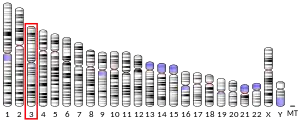3-hydroxyacyl-CoA dehydratase 2 is a protein that in humans is encoded by the HACD2 gene. [5]
Function
The protein encoded by this gene can catalyze the third step (dehydration) in the conversion of long chain fatty acids to very long chain fatty acids. The encoded protein localizes to the endoplasmic reticulum membrane.
References
- 1 2 3 GRCh38: Ensembl release 89: ENSG00000206527 - Ensembl, May 2017
- 1 2 3 GRCm38: Ensembl release 89: ENSMUSG00000035376 - Ensembl, May 2017
- ↑ "Human PubMed Reference:". National Center for Biotechnology Information, U.S. National Library of Medicine.
- ↑ "Mouse PubMed Reference:". National Center for Biotechnology Information, U.S. National Library of Medicine.
- ↑ "Entrez Gene: 3-hydroxyacyl-CoA dehydratase 2". Retrieved 2017-09-22.
Further reading
- Wang B, Pelletier J, Massaad MJ, Herscovics A, Shore GC (2004). "The yeast split-ubiquitin membrane protein two-hybrid screen identifies BAP31 as a regulator of the turnover of endoplasmic reticulum-associated protein tyrosine phosphatase-like B". Mol. Cell. Biol. 24 (7): 2767–78. doi:10.1128/mcb.24.7.2767-2778.2004. PMC 371098. PMID 15024066.
- Rose JE, Behm FM, Drgon T, Johnson C, Uhl GR (2010). "Personalized smoking cessation: interactions between nicotine dose, dependence and quit-success genotype score". Mol. Med. 16 (7–8): 247–53. doi:10.2119/molmed.2009.00159. PMC 2896464. PMID 20379614.
This article incorporates text from the United States National Library of Medicine, which is in the public domain.
This article is issued from Wikipedia. The text is licensed under Creative Commons - Attribution - Sharealike. Additional terms may apply for the media files.



